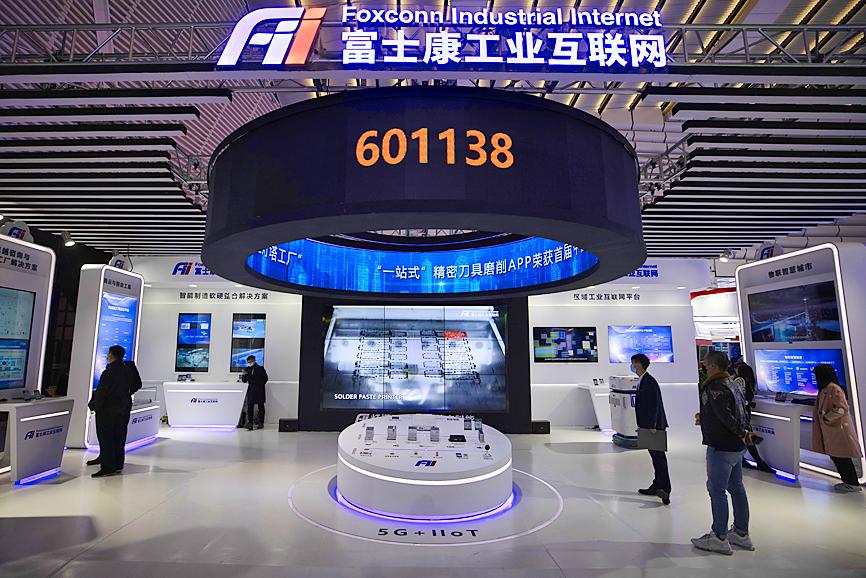Foxconn Industrial Internet Co Ltd (FII, 富士康工業互聯網) has invested 9.8 billion yuan (US$1.46 billion) in state-backed Chinese chip company Tsinghua Unigroup (紫光集團) through a private equity fund.
The Shanghai-listed server and networking devices firm, which is 85 percent owned by Hon Hai Precision Industry Co (鴻海精密), is planning to invest in the semiconductor industry. It now holds a 15 percent stake in Tsinghua Unigroup through the newly formed Xingwei (Guangzhou) Industrial Investment Partnership Ltd (興微廣州產業投資) fund.
Created in March along with Beijing Zhilu Asset Management Co (北京智路資產管理), the fund is one of 10 equity funds comprising Beijing Zhiguangxin Holding Co (北京智廣芯控股).

Photo: EPA-EFE
Beijing Zhiguangxin now owns 100 percent of Tsinghua Unigroup after injecting 54.9 billion yuan into the cash-strapped chipmaker, the corporate registration of the firm showed on Monday.
Tsinghua Unigroup said it has completed its reorganization plan and emerged from bankruptcy.
“FII is an independent company, listed on the Chinese stock market. The company raised capital in China and used the proceeds to invest in third-party private equity funds, with an aim to explore new technologies and investment targets to fuel the company’s future expansion,” the Hon Hai subsidiary said in a statement.
Tsinghua Unigroup is China’s largest chip company, counting memorychip maker Yangtze Memory Technologies Co (長江存儲) and mobile phone chipmaker Unisoc (Shanghai) Technologies Co (紫光展銳) as major semiconductor subsidiaries.
The transaction requires approval from the Investment Commission, as sensitive technologies are involved, the commission yesterday told the Taipei Times.
Technologies linked to foundry, chip design, testing and packaging are considered sensitive, a commission official said, adding that the deal also requires a technology review conducted by a special task force, as the investment is above US$500 million.
FII last month acquired four chip testing and packaging facilities in China’s Kunshan from ASE Technology Holding Co (日月光投控) through a Chinese private equity fund for an unspecified sum.
Apple Inc started to test sample NAND flash storage made by Yangtze Memory this year, as the US company is considering new sources of memory chips for iPhones to limit supply disruptions, Bloomberg News has reported.
New Unigroup chairman Li Bin (李濱) yesterday said the company is seeking to expand beyond chips to sectors such as genetics and artificial intelligence.
“History has proven that all scientific development and national prosperity depends, among other things, on realizing where one is ignorant,” Li wrote in a memo to employees. “And then it’s the ability to remain curious, endlessly explore and learn, and seek progress.”
Additional reporting by Bloomberg

To many, Tatu City on the outskirts of Nairobi looks like a success. The first city entirely built by a private company to be operational in east Africa, with about 25,000 people living and working there, it accounts for about two-thirds of all foreign investment in Kenya. Its low-tax status has attracted more than 100 businesses including Heineken, coffee brand Dormans, and the biggest call-center and cold-chain transport firms in the region. However, to some local politicians, Tatu City has looked more like a target for extortion. A parade of governors have demanded land worth millions of dollars in exchange

Hong Kong authorities ramped up sales of the local dollar as the greenback’s slide threatened the foreign-exchange peg. The Hong Kong Monetary Authority (HKMA) sold a record HK$60.5 billion (US$7.8 billion) of the city’s currency, according to an alert sent on its Bloomberg page yesterday in Asia, after it tested the upper end of its trading band. That added to the HK$56.1 billion of sales versus the greenback since Friday. The rapid intervention signals efforts from the city’s authorities to limit the local currency’s moves within its HK$7.75 to HK$7.85 per US dollar trading band. Heavy sales of the local dollar by

Taiwan Semiconductor Manufacturing Co’s (TSMC, 台積電) revenue jumped 48 percent last month, underscoring how electronics firms scrambled to acquire essential components before global tariffs took effect. The main chipmaker for Apple Inc and Nvidia Corp reported monthly sales of NT$349.6 billion (US$11.6 billion). That compares with the average analysts’ estimate for a 38 percent rise in second-quarter revenue. US President Donald Trump’s trade war is prompting economists to retool GDP forecasts worldwide, casting doubt over the outlook for everything from iPhone demand to computing and datacenter construction. However, TSMC — a barometer for global tech spending given its central role in the

An Indonesian animated movie is smashing regional box office records and could be set for wider success as it prepares to open beyond the Southeast Asian archipelago’s silver screens. Jumbo — a film based on the adventures of main character, Don, a large orphaned Indonesian boy facing bullying at school — last month became the highest-grossing Southeast Asian animated film, raking in more than US$8 million. Released at the end of March to coincide with the Eid holidays after the Islamic fasting month of Ramadan, the movie has hit 8 million ticket sales, the third-highest in Indonesian cinema history, Film